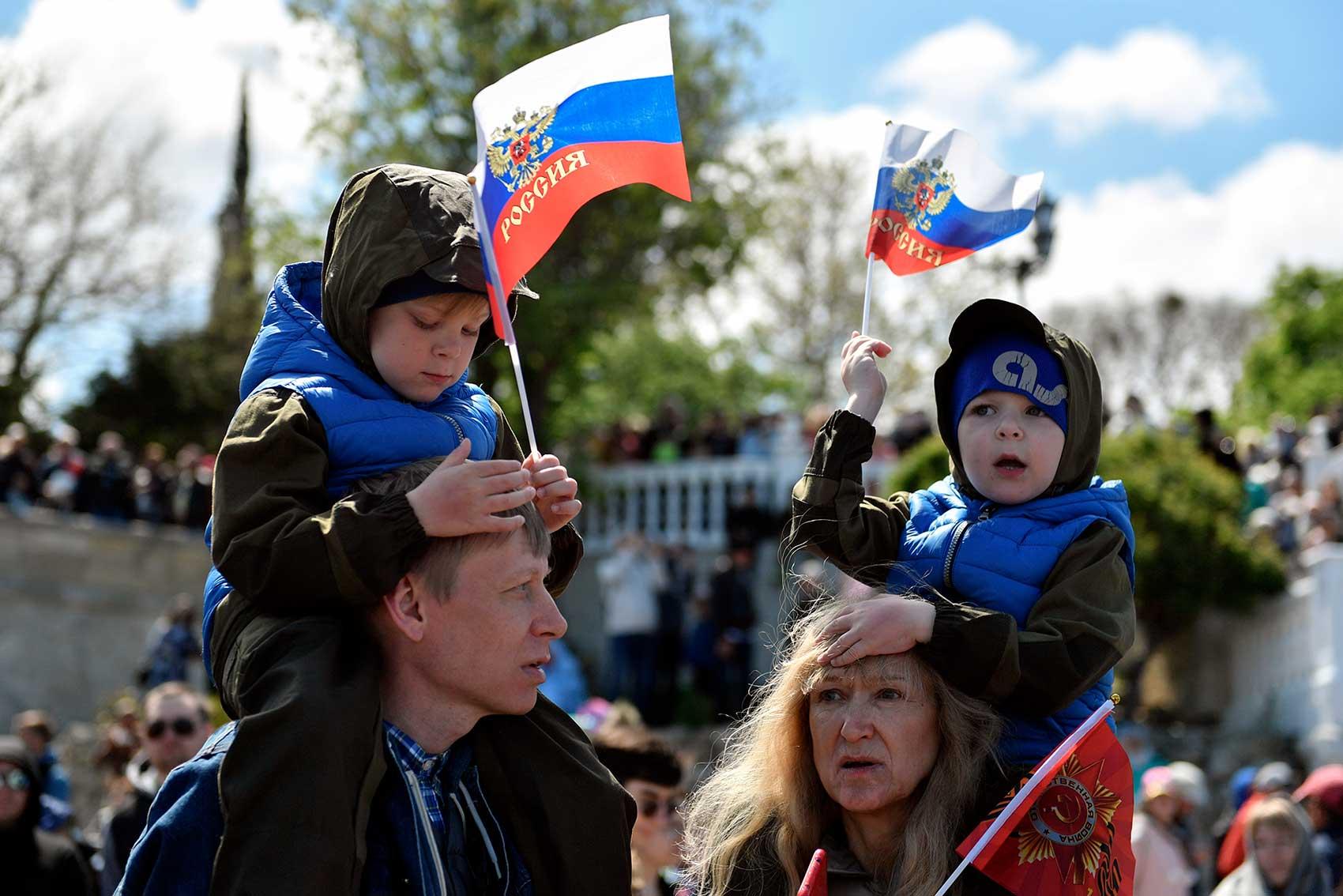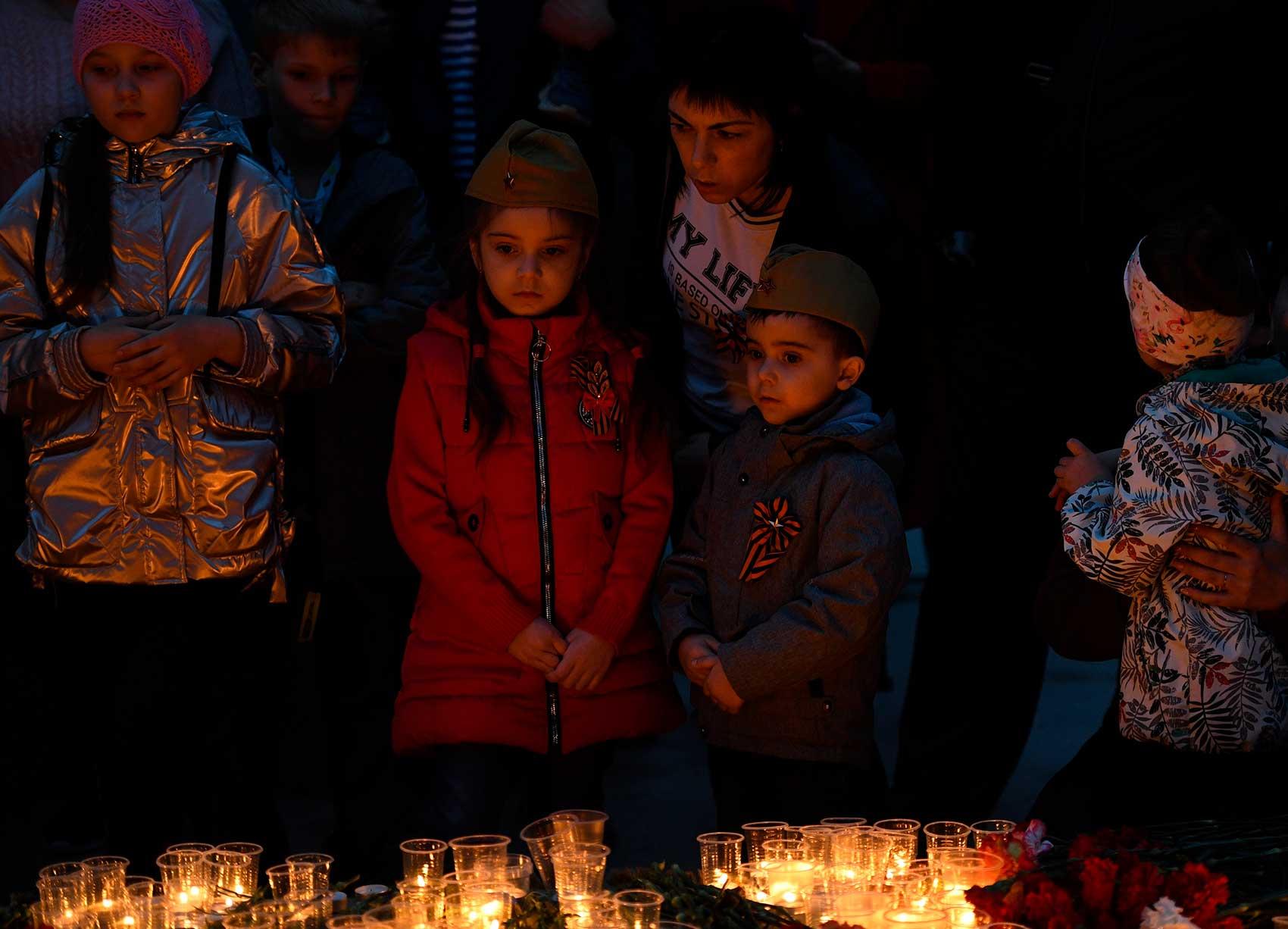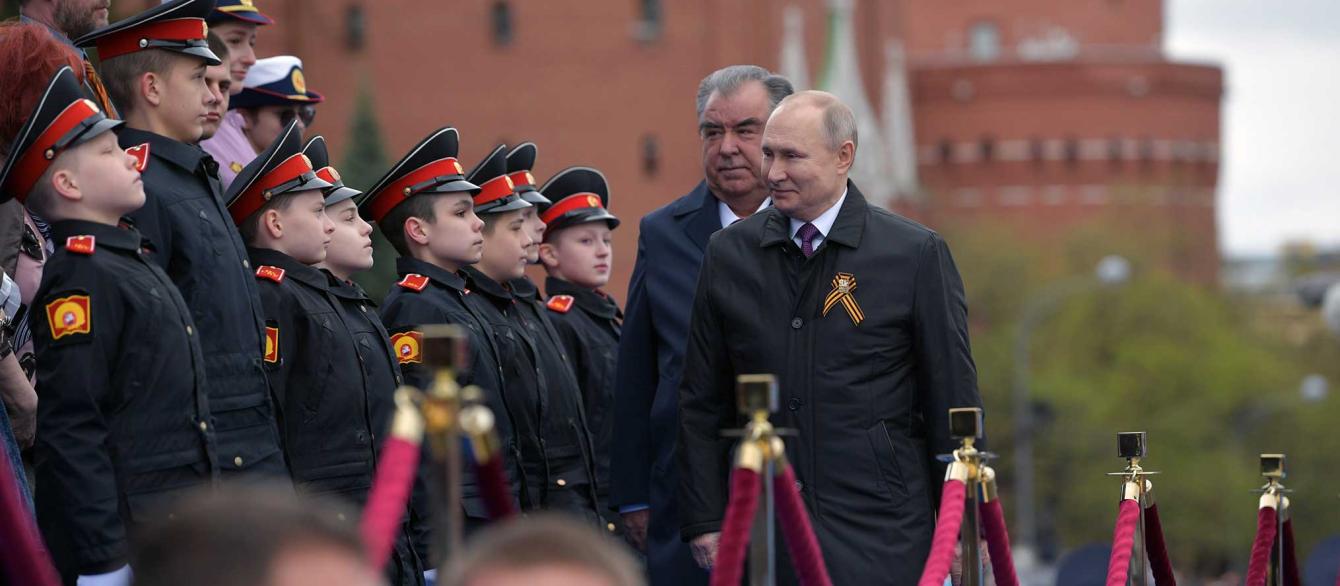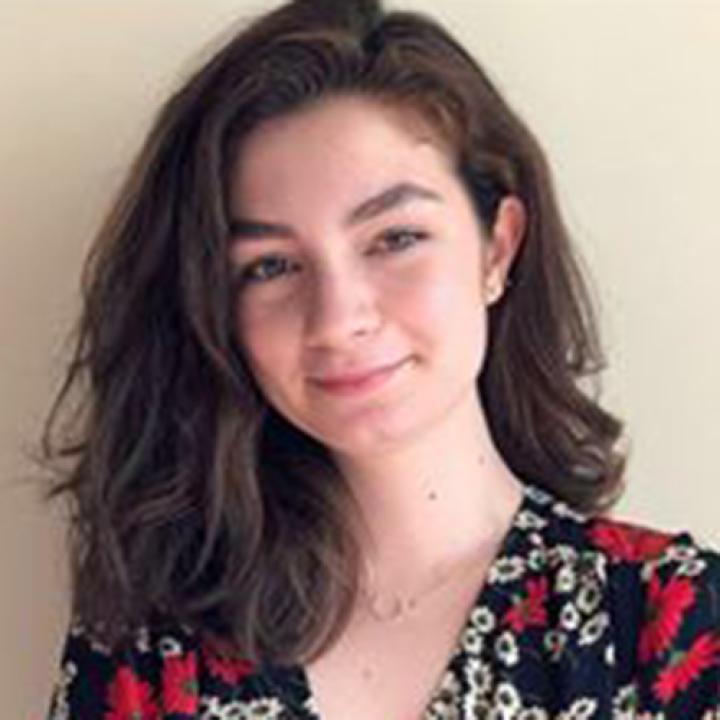No single historical event has occupied the collective consciousness of the people of the Russian Federation like the Great Patriotic War. During the years of Vladimir Putin’s presidency, the Kremlin has sought to promote a specific historical interpretation of the conflict: The Soviet Union was the victim of an unforeseeable and extremely brutal Nazi invasion, suffered great military and civilian losses that were tragically unavoidable, but the Soviet people, through bravery and strength of character, ultimately and decisively prevailed and saved all of humanity from the absolute evil of fascism.
In recent years, the Putin administration has treated the narrative of victory as a zero-sum game and emphasized that Russia, as the successor state to the Soviet Union, has been unfairly denied recognition for Allied victory by political leaders in Western Europe and the United States. This narrative has served as a rationalization for the militarization of Russian society, the targeted repression of civil society organizations and political opposition, and, most recently, as a justification for Russia’s invasion of Ukraine in 2022. While ritualized public commemorations of the war in Russia invoke a broad pantheon of representative images and discursive devices in service of the dominant Kremlin narrative of the war, the role played by children emerges as a consistent and distinctive feature.
Putin’s return to the presidency in 2012 for a third term coincided with a pivotal moment of generational change that has had significant implications for the practices of memory politics in post-Soviet Russian society. As authoritative sources of firsthand knowledge about the war have disappeared from post-Soviet Russian society’s collective memory, an informational and emotional vacuum is formed, necessitating intervention from new memory gatekeepers. Although this period of generational change has been rightly characterized as a period of heightened anxiety about collective memory and national identity, it also represents an opportunity for consolidating authoritarian legitimacy, through the implementation of new frameworks of morality and novel measures of social control into Russian society.
Putin’s co-optation of the ritual of teaching further suggests that, from the perspective of the Kremlin, the task of historical education must not be left in the hands of those unqualified to meet the attendant demands of political and patriotic education.
The role of patriotic education has become increasingly central to President Putin’s agenda in the last two decades, and the Kremlin has made significant investments in legislative reform and funding allocations toward these goals. Public relations events, such as an open lecture on the history of the Second World War given by President Putin on September 1, 2020 (the traditional opening of the academic year in schools across the Russian Federation), represent a striking development in a trend observed by Andrei Kolesnikov: after his reelection to a third presidential term in 2012, Putin has increasingly positioned himself as an authority not only on factual questions related to the history of the Second World War, but as the interpreter of the moral lessons of this period as well.Андрей Колесников, “История под ружьем: несекретная война Кремля.” Carnegie Moscow Center. April 9, 2020. https://carnegie.ru/2020/04/09/ru-pub-81437 While he has frequently participated in open lesson-style public relations events in the past, by personally leading an open lesson on the Great Patriotic War, President Putin both assumes the authoritative role of veterans and eliminates the function of professional educators (history teachers, museum directors, civil society actors, etc.), framing himself as the locus of historical knowledge and transmission of patriotic values for children.
Ultimately, Putin’s co-optation of the ritual of teaching further suggests that, from the perspective of the Kremlin, the task of historical education must not be left in the hands of those unqualified to meet the attendant demands of political and patriotic education, namely school teachers, as well as professional scholars and academics working at the university level.
Although children do tend to prominently figure into memory work because the state wants to foster patriotic sentiment in citizens from an early age, as well as inculcate respect for national history and deference to elders, there is an additional, understudied dimension to the phenomenon. In recent years, the Kremlin has emphasized a threat of ideological corruption, or the perpetuation of anxieties throughout Russian society that children will be indoctrinated with ‘morally incorrect’ (Western-coded) interpretations of history, leading to the destabilization of traditional Russian society. Indeed, recent years have witnessed growing public discourse surrounding education about the wartime period in post-Soviet life.

Children wave Russian national flags during Victory Day celebrations marking the the 76th anniversary of the victory over Nazi Germany in World War Two, in Sevastopol, Crimea, on May 9, 2021.
As both metaphor and metonym, children represent an ideal object for the production of anxiety through the insinuation of the corruption of innocence, as well as the intimation that this corruption could soon be visited upon one’s own child in the concrete. In Victory Day speeches and other public appearances, President Vladimir Putin directly articulates a vision of the youngest generations of Russians who have been made victims of historical revisionism. During a meeting in May 2021 of the “Victory” Organizing Committee, of which President Putin himself is the chairman, he raised the issue of the “virus of forgetfulness” as a distinct threat to contemporary youth in Russia:
“The virus of forgetfulness of course primarily affects—and make its victim—young people. Unfortunately, our young people are brainwashed so that they often forget about the heroic feats performed by their ancestors, by those close to them. Moreover, they begin to worship those who killed their grandfathers and great-grandfathers.”
Why does Putin invoke the image of infection as his guiding metaphorical device when discussing the threat of ideological indoctrination or, more explicitly, brainwashing? This choice in framing renders the ideological threat as an invisible, yet ubiquitous force that thrives in an environment of unpatriotic passivity, permeating society without an obvious agent attached to it. Notably, Putin argues that this process occurs in a series of escalating stages: “forgetfulness or unconsciousness” (bespamiatstvo), then “brainwashing” (promyvaiut mozgi) that produces a moral or intellectual vacancy in place of patriotic memory, and finally replaces it with the most threatening alternative: a sort of false idolatry (nachinaiut pokloniat’sia) towards the fascists who killed their fellow Russians, and presumably by extension towards any contemporary enemies of the Russian state.
The implied threat of delinquency operates on two levels: abnegation of the duties of a patriotic citizen of the state, and the filial betrayal by worshipping those who killed their grandfathers and great-grandfathers. The spread of infection as metaphor for the promotion of historical revisionism in younger generations also raises the possibility for treatment or a cure— the institution of new social control measures, such as historical memory laws, that limit the alleged social harm of the brainwashing.
The imagined threat of corruption is deployed to mobilize adults in society, such as parents and educators, into coalescing around state-driven historical narratives and promoting support for new or strengthened measures of social control.
Indeed, this is the key to understanding the larger ideological goals of historical memory work is a metaphorical reading of the role of children: children are widely considered passive thinkers, and therefore vulnerable to ideological corruption from “incorrect interpretations” of the past. This imagined threat of corruption is deployed to mobilize adults in society, such as parents and educators, into coalescing around state-driven historical narratives and promoting support for new or strengthened measures of social control.
Anxiety about generational change is a ubiquitous feature of social life, but the Putin administration has exploited the loss of the wartime generation in order to legitimize its authoritarian control over historical interpretation. In fact, rather than “hid[ing] a widespread anxiety related to the current moment of generational change and to entering a new world without the ‘war generation,’”Julie Fedor, War and Memory in Russia, Ukraine and Belarus. Palgrave Macmillan Memory Studies. Cham, Switzerland: Palgrave Macmillan, 2017, 3. the Putin administration embraces and in fact perpetuates the environment of anxiety to redefine the parameters of morality. In this regard, the passing of the war generation does not represent an organic societal crisis, at least not more so than other generational shifts; rather it is an opportunity for a manufactured crisis, one that is promoted by the Russian state in order to reduce ambiguity and reinforce its own manufactured legitimacy.

Children attend an event in remembrance of victims of World War II on the eve of the 76th anniversary of Victory Day over Nazism, at the Monument of Glory, in Novosibirsk, Russia.
Recently, discourse in the Russian Federation surrounding the victimization of children has escalated in order to shape public opinion and justify the devastating invasion of Ukraine. Mediazona, one of the few remaining independent news organizations in Russia, has actively reported on discussions of the war (officially only referred to as a “special military operation” with the goal of “denazification of Ukraine”) in school lessons and coursework, including presentation slides from social studies for students in grades 6-8. Information on these slides asks students to consider whether they would want to “become an object in a war for history” and includes photographs of the Red Army raising the Soviet flag over the Reichstag in 1945. A lesson plan for grades 7-11 includes a directive for parents as well, warning that “children are curious and active, but, unfortunately, they do not notice the situation of manipulation of their activity by unscrupulous adults. All this can involve the child in illegal actions and turn into a deplorable situation.”
Such rhetoric has already resulted in instances in which even very young children, along with their parents, have been arrested at anti-war protests in Russia and detained for hours. These narratives are identical to those that Vladimir Putin, as well as his allies in politics and in the press, have previously employed to foment fear and establish a pretext for social control and repression within Russian society; the difference in the phase currently evolving is merely one of degree rather than of kind, and leads only to the tragic and unnecessary suffering of the children who will be killed, injured, orphaned and displaced in Ukraine.
Cases such as these succeed in inflaming public debate precisely because they coalesce around anxieties regarding children, grafting the fears and conservative impulses of adults upon the canvas of innocent and impressionable childhood. Political maneuvers about children’s education are almost never only about the children in question, in much the same way that public debates about the meanings and legacies of historical events are mediated by imagined versions of both the past and the future.






